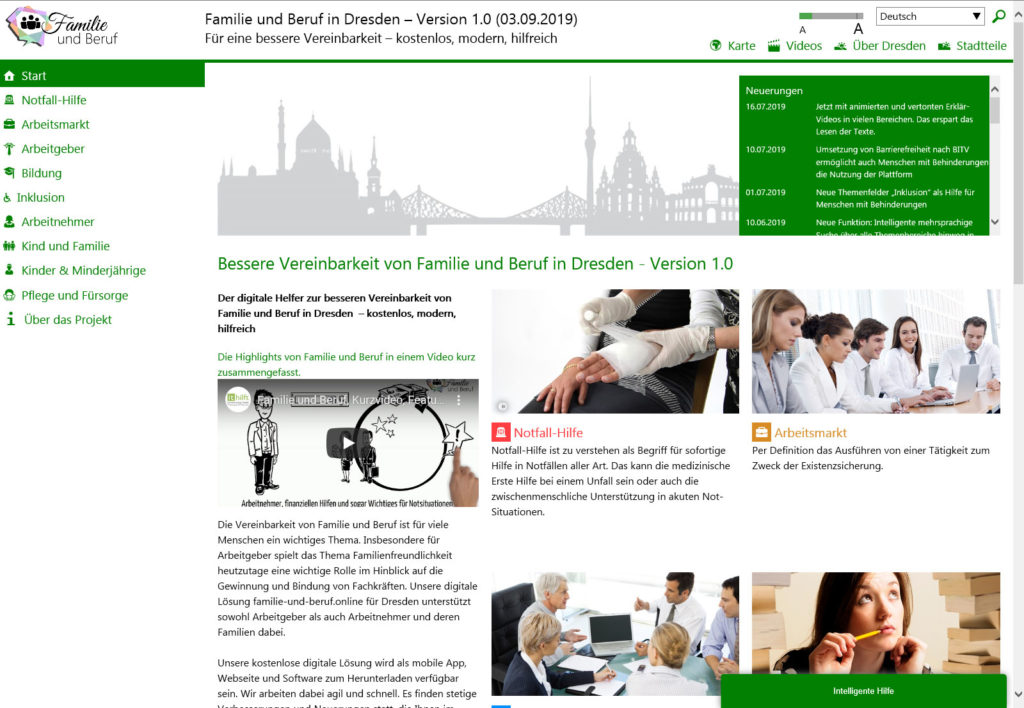Easy language is not so difficult
Verbal language is just as much a part of the user experience as images or sounds. All too often, our language is too complicated for the “normal consumer”. Official language, legalese and contractual language sometimes make it almost impossible to understand the context. People with learning difficulties or other barriers, such as people who are just learning German, are left behind and excluded by complicated language.
Easy language is helpful for many people.
Simpler language would often help, but is not quite enough. In order to be able to exercise their right to participation, the Association of People with Learning Difficulties has defined plain language as the standard. Offering alternatives in plain language is becoming more and more an obligation for public authorities or platforms that have been publicly funded. We meet this obligation on our platform for family and work – out of conviction and because it was funded with EU funds.
Have a look here: https://dresden.familie-und-beruf.online/de-de/index.html
Moreover, we took the topic so seriously that five of us did a course. Now we regularly write in plain language from time to time. Because plain language is not that difficult, we would like to share our knowledge. So that you too can use plain language for yourself and your platforms, here are the basics and the most important rules.
Simple language rules for the layout of the text:
- Clear and simple layout (clear, straight, maximum 2s-columns, without overlays)
- Simple and clear font (sans serif only)
- Large font (optimally 14 point)
- Left-align text (never justify)
- 1.5 times the line spacing (not the 1.1 times standard, because this is visually overwhelming)
- High-contrast implementation (e.g. without photos in the background)
- Use pictures to supplement (explanatory photos or illustrations)
- Highlight important content (e.g. bold, larger or coloured)
Simple language rules for structure and wording:
- Many paragraphs and headings
- Simple sentence structure (subject – predicate – object)
- Break down into short sentences (maximum 12 words)
- Only one statement per sentence (only one line for printed matter)
- Start a new sentence with new content (use a full stop more often and do not use commas).
- Work with examples (some are in brackets here)
- Active words / formulation (instead of passive and subjunctive)
- Avoid the dative (Peter’s trousers instead of Peter’s trousers)
- Repetition of important words (As used here in plain language.)
- Equal words for equal
- Personal debate (Please sit here politely. Doing so only with friends and acquaintances).
- Positive language (We look forward to seeing you.)
Simple language rules on word choice and formatting
- Separate long words with a hyphen (e.g. employment agency, disabled-friendly entrance)
- Short words
- Use familiar words
- Use simple words
- Explain difficult words (Very important for technical terms.)
- Use verbs (instead of nouns)
- Arabic numbers instead of words (also 1 – 12 as digits)
- For date & time by default (as 9:00 am or 7:00 pm).
- Avoid special characters like § (instead use the word)
- Use only common abbreviations (truck or OK is fine. Write out Ect.)
- Simplified masculine form (instead of Gerder language with *innen)
Easy language can be learned
If easy language is an issue for you, we will be happy to support you as a service or teach it as part of the accessibility training course


